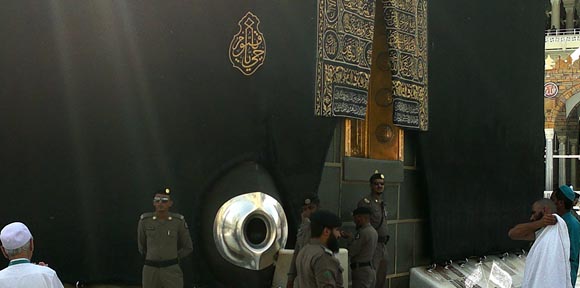Square shaped Holy Ka'aba in Makkah in the Arabian Desert has always been a sacred place for pilgrimage. From generations, Quraysh – among the most respected tribes in Makkah, was charge de affairs of the Holy Ka'aba. After the flood in Makkah sometimes in 605 AD damaged the walls of the Holy Ka'aba, Quraysh decided to reconstruct the holy structure.

[The reconstruction began with much fanfare but stopped due to the dispute over the honour of the coveted task of placing Hajr-e-Aswad - the sacred black stone to its place.]
The reconstruction began with much fanfare but stopped due to the dispute over the honour of the coveted task of placing Hajr-e-Aswad - the sacred black stone to its place. For days everything in Makkah came to halt. A fight was imminent. At this juncture Abu Umayyah Makhzumi proposed a solution. The first person to enter into the Masjid Al Haram would be our adjudicator, he suggested. Masjid Al Haram is the mosque in Makkah that surrounds the Holy Ka'aba. The suggestion received acceptance from everyone. In utmost anticipation and with their eyes glued to the entrance they waited for hours. Finally they saw a man entering the mosque. He was yet to arrive at them but elated they began shouting in unison, "He is the most trusted one among us. He is our adjudicator. He is Mohammad." Mohammad had a solution that satisfied everyone. An imminent bloody fight was averted.
Mohammad was thirty-five years old then and it was the time when neither he nor others had a hint about him being bestowed with responsibility of the prophecy by the Almighty Allah. Strangely the very man, who was regarded as one of the most trusted, the most respected and the most gentle among them and the very man, who had earned total faith from everyone in the Arabian Desert, was forced to leave his home after becoming the Prophet. The people who till then were all praise for him turned against him. However, the man of integrity as he always was, Mohammad remained the same.
Birth and Early life in Makkah
Fourteen hundred and thirty-eight years ago in April 571 on 9th, and by some accounts on 12th, of the ongoing month Rabi-ul-Awwal in the Islamic calendar, a baby was born in Banu Hashim, the most respected household of Quryash. Abdul Mutallib, grandfather of the newly born and chief of Banu Hashim was ecstatic. "Ecstatic, he took his grandson to Holy Ka'ba. Prayed for him and named him as Mohammad", renowned historian Ibne Hesham has narrated.
Mohammad as he grew older earned praise and trust from everyone. "He is the one who is treating the kindred well, speaking the truth, restoring what is entrusted on him, bearing the burden of the helpless, helping the poor, entertaining the guests and the one who is cooperating in good works", Imam Bukhari has quoted the Prophet's noble wife Khadeeja as saying. Khadeeja owing to these virtues combined with his unprecedented honesty, years before Mohammad became the Prophet proposed to him for marriage.
On August 10, 610 with the first revelation while praying inside the cave at Mount Hira two miles from Makkah Mohammad was commissioned as the Messenger of Allah. He had now been entrusted with the responsibility of preaching for equality, justice, peace and for a life accountable to Allah. These were the values unheard of in those days. On expected lines the Message did not go well with those enjoying the corridors of power. They felt threatened and with this began the testing time for Mohammad. His own relatives were now enemies. His friends behaved like a foe.
At times, they also lured him with various offers. Failed, they even tried to assassinate him. Makkah that till then was generous to him became exactly opposite to say the least. Even worst the suffering was not limited to him alone. It took his family and the companions also into its grip. Abu Laheb, his paternal uncle and neighbor, forced his two sons to divorce Mohammad's daughters. Despite all odds, however, Mohammad remained firm and maintaining restraint went on to preach what he believed was right.
Migration to Madinah and Conquest of Makkah
After fourteen years of persistent suffering, at last Allah granted Mohammad the permission to migrate. He reached Yathrib on September 27 in 622 AD where a grand welcome awaited him. With his arrival in Yathrib 600 miles from Makkah, it became Madinat-ur-Rasool – the City of the Prophet and its natives became Ansars. They opened their hearts for the migrants, the Muhajereen. With the migration began emerging a new society based on equality and justice.
Nevertheless the development was unacceptable for his rivals in Makkah. They began targeting Mohammad and his companions with renewed vigor. They tried to assassinate him afresh. At one time they had almost decided to desecrate his mother's grave. Their tirade left Mohammad with no option but to defend. Within eight years he was back in Makkah, this time as a victor. In Makkah those who were up for his life and involved in heinous crimes against him and his companions in one way or the other, were all at his mercy. Mohammad at this deciding moment reaffirmed how gentle and merciful he was. He didn't take revenge from anyone. Not even from Hind, the woman who had mutilated his beloved uncle Hamzah's dead body after he was martyred in the battle of Uhud. "There is no revenge today", the Prophet declared after the conquest and pardoned them all.
The Message crosses the Arabian Peninsula
Even before winning Makkah, Prophet Mohammad had sent his emissaries to various places including the empires of Roma and Persia, the superpowers of the time. With the Conquest of Makkah began not only the formation of a confederacy of various Arabian tribes under the banner of Islam but it also began spreading to the areas beyond the Arabian Peninsula.
For Hajj in Makkah in 632 AD (10 AH) Mohammad, the Prophet (pbuh) delivered the historic sermon that later turned out as the last sermon of his life. The sermon had all that is needed to build a safer, beautiful and just society. On top among these guidelines were the rights of the women. "O People, it is true that you have certain rights with regard to your women. Do treat your women well and be kind to them for they are your partners and committed helpers", the Prophet (pbuh) asserted. The mission was accomplished. Few months after delivering the sermon, the Prophet (pbuh) died. He was 63 when he breathed last on 12th of Rabi-ul-Awwal, 11 AH in 632 AD. However his mission still goes on.
[With inputs from Ar Raheequl Makhtoom, the book written by the Indian scholar Safeeur Rehman Mubarakpuri. The book had won the King Faisal International Award in 1978. The article first published in The Times of India, Mumbai, March 10, 2009.]
 | Quick links
| Quick linksNews
National
International
Regional
Politics
Education & Career
Business
Science & Technology
Health
Views & Analysis
The Funny Side
© 2012 Awaz Multimedia & Publications. All rights reserved.

True love of the Messenger of Allah (pbuh) is manifested by following in his footsteps and supporting his Sunnah, he says
Historians however are unanimous that the Prophet (pbuh) died on 12th of Rabi'ul Awwal. Considering this also any kind of celebrations on the day when the Prophet (pbuh) died is illogical....... More
Also Read: Prophet Muhammad and Human Dignity

Defending his praise for Nizam and visiting his grave on the occasion of his death anniversary, KCR said when people in Andhra Pradesh can celebrate birth and death anniversary of Arthur Cotton, a British engineer, why can't he visit the Nizam's grave.. ..... More

Stating that Islamic banking and finance are not yet complete in terms of answering the duties Muslims are called upon to fulfil, award winning expert of the field, Abdul Halim bin Ismail, proposed establishment of a 'Sadaqah House' to help the poor and needy. Speaking to the National the award... More

On his Twitter timeline, Satish/Abdul had hurled abuses at a wide range of people such as Bangalore police commissioner MN Reddi, DCP (crime) Abhishek Goyal, Union home minister Rajnath Singh and Prime Minister Narendra Modi. He had threatened to bomb the Alvas College in Moodbidri in . ..... More

Every human being is born a Muslim, later the parents make him or her Jew, Christian or Hindu, he pleads; invites VHP and RSS leaders to read Quran
As the reports of forced conversions continue to pour in from different parts of India indicating that the Hindutva organizations do not have any plan as of now to desist from their controversial ...... More
Also Read: Post 'conversion attempt', Agra Muslims are more staunch believers in Islam

Ever since the terror attack took place Dec 16 at a school in Peshawar where over 140 people, mostly children, were killed, hashtags like #PeshawarAttack and #IndiawithPakistan have been trending on Twitter, creating a bridge to connect citizens of the two neighbouring nations...... More
Also Read: Dilip Kumar grieves for hometown Peshawar









